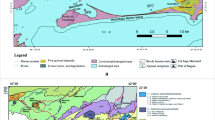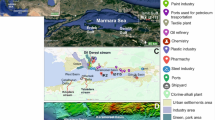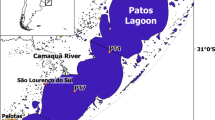Abstract
This work deals with the geochemistry of the sediments from the Santarém-Entre Valas (SEV) borehole, in the middle Tagus alluvial plain in Portugal. Methods for background determination were used, notably the concentration–length and cumulative frequency methods. Both methods were in excellent agreement for the elements of interest, namely Au, As, Fe, U, Cu, Pb, Zn, Co, and Cr. With these results, five segments in the SEV borehole were identified to have higher than background values for at least two or more of these elements. The most important segment spans at least 1,500 years during the Early Holocene Warm Period, with almost all elements with anomalous values. This has been interpreted as the result of enhanced weathering of the host rocks upstream as a consequence of deglaciation since the Last Glacial Maximum and general wetter conditions known to have occurred in this region. No other segment of the core has shown a similar variety of elements with higher than background values, but the upper segments correlate with the particular mineralogy on the sediments due to the development of an estuarine environment at circa 3,000–4,000 cal. years BP. The presence of charcoal and charred organic matter during the beginning of the Bronze Age characterises the segment with the first high values of Cu, but apart from deforestation and land use that affected this region at the time, this anomaly is likely due to the chemical affinity of Cu to organic matter and not to anthropogenic activities. Finally, the upper meter of the core sediments, spanning 812 years, have a clear anthropogenic signal for Cu (also seen in other two boreholes) and systematic high values for Au (and Pb). Although Cu is surely an indication of secular agricultural practices (vineyard sulphatation), Au (and Pb) might be the natural accumulation from weathering of ancient mine wastes scattered in the Hercynian Massif upstream.








Similar content being viewed by others
References
Ahmed KM, Bhattachanya P, Hassam MA, Akhtar SH, Alam SMM, Bhuyian MAH, Imam MB, Khan AA, Sracek O (2004) Arsenic enrichment in groundwater on the alluvial aquifers in Bangladesh: an overview. Appl Geochem 19:181–200
Allan JC (1965) A mineração em Portugal na Antiguidade. Boletim de Minas 2(3):139–175
Anderson TW, Darling DA (1952) Asymptotic theory of certain “goodness-of-fit” criteria based on stochastic processes. Ann Math Stat 23:193–212
Azevêdo TM (2004) As mudanças de percurso do Tejo nos tempos modernos. Causas naturais e antrópicas. In: Tavares et al (eds) Evolução geohistórica do litoral português e fenómenos correlativos. Geologia, história, arqueologia e climatologia. University of Aberta, Lisboa, pp 517–567
Azevêdo TM, Nunes E, Ramos C (2004) Some morphological aspects and hydrological characterization of the Tagus floods in the Santarém region, Portugal. Nat Hazard 31(3):587–601
Azevêdo TM, Ramos-Pereira A, Ramos C, Nunes E, Freitas MC, Andrade C, Pereira DI (2007) Floodplain sediments of the Tagus River, Portugal: assessing avulsion, channel migration and human impact. In: Nichols G, Williams E, Paola C (eds) Sedimentary processes, environments and basins—a tribute to peter friend. International Association of Sedimentologists, Special Publication 38, Blackwell Publishing, London, pp 535–554
Blanco Freijero A, Rothenberg B (1981) Exploración arqueometalúrgica de Huelva. Labor, Barcelona
Cabral J, Moniz C, Ribeiro P, Terrinha P, Matias L (2003) Analysis of seismic reflection data as a tool for the seismotectonic assessment of a low activity intraplate basin—the Lower Tagus Valley (Portugal). J Seismol 7:431–447
Cabral J, Ribeiro P, Figueiredo P, Pimentel N, Martins A (2004) The Azambuja fault: an active structure located in an intraplaque basin with significante seismicity (Lower Tagus Valley, Portugal). J Seismol 8:347–362
Carvalho J, Cabral J, Gonçalves R, Torres L, Mendes-Víctor L (2006) Geophysical methods applied to fault characterization and earthquake potential assessment in the Lower Tagus Valley, Portugal. Tectonophysics 418:277–296
Chabaux F, Riotte J, Dequincey O (2003) U-Th-Ra fractionation during weathering and river transport. In: Bourdon B, Henderson GM, Lundstrom CC, Turner SP (eds), Uranium-series Geochemistry, Rev Mineral Geochem 52:533–576
Cheng Q (1999) Spatial and scaling modelling for geochemical anomaly separation. J Geochem Explor 65(3):175–194
Cheng Q, Agterberg FP, Ballantyne SB (1994) The separation of geochemical anomalies from background by fractal methods. J Geochem Explor 51(2):109–130
Choi SW, Park JH, Lee I-B (2004) Process monitoring using a Gaussian mixture model via principal component analysis and discriminant analysis. Comput Chem Eng 28:1377–1387
Christopher B (1996) Neural networks for pattern recognition. Clarendon, Oxford
Coudé-Gaussen G (1978) Confirmation de l’existence d’une glaciation wurmienne dans les montagnes du Nord-Ouest du Portugal. Quad Lab Xeol Laxe 5:381–393 Coruña
Cunha PP, Martins A, Daveau S, Friend P (2005) Tectonic control of the Tejo river fluvial incision during the late Cenozoic, in Rodão—Central Portugal (Atlantic Iberian border). Geomorphology 64:271–298
Daveau S (1971) La glaciation de la Serra da Estrela. Finisterra 11:5–40 Lisboa
Dias JA (1987) Dinâmica sedimentar e evolução recente da plataforma continental portuguesa setentrional. PhD Thesis, University of Lisboa, p 471
Evertsz CJG, Mandelbrot BB (1992) Multifractal measures (Appendix B). In: Peitgen H-O, Jurgens H, Saupe D (eds) Chaos and fractals. Springer, New York, pp 921–953
Fairbanks RG, Mortlock RA, Chiu TC, Cao L, Kaplan A, Guilderson TP, Fairbanks TW, Bloomes AL (2005) Marine radiocarbon calibration curve spanning 10,000 to 50,000 years BP based on paired 230Th/234U/238U and 14C dates on pristine corals. Quat Sci Rev 24:1781–1796
Ferreira AB (1993) Manifestações geomorfológicas glaciárias e periglaciárias em Portugal- in O Quaternário em Portugal. Balanço e perspectivas. Assoc. Port. para o Estudo do Quaternário (APEQ), ed. Colibri, pp 75–84, Lisboa
Fleming BW (2000) A revised textural classification of gravel-free muddy sediments on the basis of ternary diagrams. Cont Shelf Res 20:1125–1137
Friedman GM (1961) Distinction between dune, beach and river sands from their textural characteristics. J Sediment Petrol 31:514–529
Gaillardet J (2008) Isotope geochemistry as a tool for deciphering kinetics of water–rock interaction. In: Brantley SL, Kubicki JD, White AF (eds) Kinetics of water–rock interaction. Springer, New York, pp 591–653
García MJG, Valiño MD, Rodríguez AV, Zapata MBR (2002) Late-glacial and Holocene palaeoclimatic record from Sierra de Cebollera (northern Iberian Range, Spain). Quat Int 93–93:13–18
Gonçalves MA, Vairinho M, Oliveira V (1998) Study of geochemical anomalies in Mombeja area using a multifractal methodology and geostatistics. In: Buccianti A, Nardi G, Potenza R (eds) IV IAMG’98. De Frede, Ischia Island, pp 590–595
Gonçalves MA, Mateus A, e Oliveira V (2001) Geochemical anomaly separation by multifractal modelling. J Geochem Explor 72(2):91–114
Halda M, Anderssonb C, Ebbesena H, Jansenb E, Klitgaard-Kristensenc D, Risebrobakkenb B, Salomonsena GR, Sarntheind M, Sejrupe HP, Telfordb RJ (2007) Variations in temperature and extent of Atlantic Water in the northern North Atlantic during the Holocene. Quat Sci Rev 26:3423–3440
Henriques R (1998) Propostas Metodológicas para a Monitorização das Zonas Costeiras—Aspectos Sedimentológicos. MSc Thesis, Faculdade de Ciências da Universidade do Porto, p 185
Henriques R (2003) SEDMAC/SEDPC: programa informático de apoio à análise dimensional de populações detríticas. Ciências da Terra—Volume Especial, VI Congresso Nacional de Geologia, Faculdade de Ciências e Tecnologia da Universidade Nova de Lisboa, Lisboa, p 40
Henriques RF (2004) SEDMAC/SEDPC: an application to support particle size analysis of unconsolidated sediments. 32nd International Geological Congress, Abs. vol. pt. 1, abs. 154–156, 726
INAG (2001) Plano Nacional da Água, vol. I e II. Instituto da Água, Ministério do Ambiente e Ordenamento do Território, Lisbon
Jesus A, Mateus A, Gonçalves MA, e Oliveira V (2003) Cu anomaly separation by multifractal modelling of soil geochemistry data from Ferreira do Alentejo to Serpa (Portugal). IV Congresso Ibérico de Geoquímica/XIII Semana de Geoquímica, Coimbra 2003, pp 205–207
Kalis AJ, Merkt J, Wunderlich J (2003) Environmental changes during the Holocene climatic optimum in central Europe—human impact and natural causes. Quat Sci Rev 22:33–79
Leduc C (1990) Interpretation des résultats de la prospection geochimique strategique sur la zone C, Baixo Douro (Portugal). Note DAM/DEX/T2 M/CL/SM1845/90, BRGM
Lepeltier C (1969) A simplified treatment of geochemical data by graphical representation. Econ Geol 64:538–550
Matheron G (1982) Pour une analyse krigeante des données regionalisées. N-732, Centre de Géostatistique et de Morphologie Mathématique – École Nationale Supérieure des Mines de Paris, Fontainebleau
Matschullat J, Ottenstein R, Reimann C (2000) Geochemical background—can we calcutate it? Environ Geol 39:990–1000
Mendonça J, Cabral J (2003) Identificação de falhas na Bacia Cenozóica do Tejo através de técnicas de investigação hidrogeológica. Comunicações do Instituto Geológico e Mineiro 90:91–102
Nicosia C, Azevêdo TM, Favaretto S, Miola A, Mozzi P, Nunes E, Sostizzo I (2007) Micromorphological and mineralogical characters of the Entre Valas SEV coring (Santarém, Portugal): evolution from a transitional to a continental sedimentary environment during the Holocene. In: Sarti L, Pizziolo G (eds) Proceedings of the congress hidden landscapes of mediterranean Europe. Cultural and methodological biases in pre- and protohistoric landscape studies. BAR (British Archaeological Reports), International Series, Siena, May 25–27 (in press)
Ramos C, Reis E, Ramos-Pereira A, Azevêdo TM, Nunes E, Freitas MC, Andrade C (2002) Late Holocene evolution of the Lower Tagus alluvial plain and heavy metals content: preliminary results. In: García-Ruiz JM, Jones JAA, Arnáez J (eds) Environmental change and water sustainability. Instituto Pirenaico de Ecología, Zaragoza, pp 167–182
Ramos-Pereira A, Ramos C, Azevêdo TM, Nunes E (2008) Middle Tagus alluvial plain evolution since the last glacial (Portugal). Geomorphology (submitted)
Reimann C, Filzmoser P (2000) Normal and log-normal data distribution in geochemistry: death of a myth. Consequences for the statistical treatment of geochemical and environmental data. Environ Geol 39:1001–1014
Reimer PJ, Baillie MGL, Bard E, Bayliss A, Beck JW, Bertrand CJH, Blackwell PG, Buck CE, Burr GS, Cutler KB, Damon PE, Edwards RL, Fairbanks RG, Friedrich M, Guilderson TP, Hogg AG, Hughen KA, Kromer B, McCormac FG, Manning SW, Ramsey CB, Reimer RW, Remmele S, Southon JR, Stuiver M, Talamo S, Taylor FW, van der Plicht J, Weyhenmeyer CE (2004) Intcal04 Terrestrial radiocarbon age calibration, 26–0 ka BP. Radiocarbon 46:1029–1058
Rosgen DL (1996) Applied river morphology. Widland Hydrology, Pagosa Springs, Colorado
Rudnick RL, Gao S (2003) Composition of the continental crust. In: Treatise on geochemistry, vol 3. The Crust, pp 1–64
Sim BL, Agterberg FP, Beaudry C (1999) Determining the cutoff between background and relative base metal contamination levels using multifractal methods. Comput Geosci 25:1023–1041
Taylor SR, McLennan SM (1995) The geochemical evolution of the continental crust. Rev Geophys 32:241–265
Tranter M (2003) Geochemical weathering in glacial and proglacial environments. In: Drever JI (ed) Treatise on geochemistry, vol 5. Surface and ground water, weathering, and soils. Elsevier, Amsterdam, pp 189–205
van der Knaap WO, van Leeuwen JFN (1995) Holocene vegetation succession and degradation as responses to climatic change and human activity in the Serra de Estrela, Portugal. Rev Palaeobot Palynol 89:153–211
Vieira G (2004) Geomorfologia dos planaltos e altos vales da Serra da Estrela. Ambientes frios do Plistocénico Superior e dinâmica actual. Dissertação de Doutoramento em Geografia (área de especialização em Geografia Física), apr. à Universidade de Lisboa, p 724 + 1 mapa
Wentworth CK (1922) A scale of grade and class terms for clastic sediments. J Geol 30:377–392
Acknowledgments
Elisabete Nunes is greatly acknowledged for her laborious assistance during manuscript preparation. The pertinent comments of an anonymous reviewer helped to improve the manuscript. MAG would like to dedicate this work to the memory of Bradley Sim.
Author information
Authors and Affiliations
Corresponding author
Rights and permissions
About this article
Cite this article
Azevêdo, T.M., Gonçalves, M.A. Geochemistry of core sediments from the Middle Tagus alluvial plain (Portugal) since the last glacial: using background determination methods to outline environmental changes. Environ Earth Sci 59, 191–204 (2009). https://doi.org/10.1007/s12665-009-0016-6
Received:
Accepted:
Published:
Issue Date:
DOI: https://doi.org/10.1007/s12665-009-0016-6




